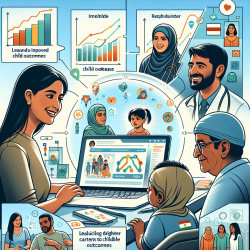Enhancing Therapy Practices: Insights from Lebanon and Sri Lanka
In the ever-evolving field of speech-language pathology, staying informed about global challenges can offer valuable insights into improving therapy practices. The recent research article titled Preparing for the Unexpected, Supporting the Vulnerable—A Perspective From Lebanon and Sri Lanka provides a compelling examination of how unexpected events like economic crises, conflicts, and natural disasters impact healthcare delivery, particularly for vulnerable populations.
Understanding the Global Context
The study highlights the profound impact of socioeconomic and political instability on healthcare systems, with a focus on chronic kidney disease (CKD) management in Lebanon and Sri Lanka. These countries have faced significant disruptions due to armed conflicts, economic downturns, and the COVID-19 pandemic. Such events have exacerbated existing healthcare inequities, making it crucial for practitioners to understand these dynamics and adapt their approaches accordingly.
Key Lessons for Practitioners
For practitioners in speech-language pathology, the insights from this research can be transformative. Here are some key takeaways:
- Adapting to Resource Constraints: Just as healthcare providers in Lebanon and Sri Lanka have had to innovate with limited resources, therapists can explore creative solutions to overcome barriers in therapy delivery.
- Focus on Vulnerable Populations: The study emphasizes the importance of prioritizing vulnerable groups, such as children and the elderly. Tailoring therapy approaches to meet the specific needs of these populations can lead to better outcomes.
- Building Resilience: Developing resilience in therapeutic practices can help practitioners prepare for unexpected challenges. This includes creating flexible therapy plans and utilizing technology to reach clients in diverse settings.
Encouraging Further Research
While the study provides valuable insights, it also underscores the need for further research in understanding the broader implications of global challenges on therapy practices. Practitioners are encouraged to explore how factors such as economic instability and cultural differences influence therapy outcomes and to contribute to the growing body of knowledge in this area.
Conclusion
By learning from the experiences of Lebanon and Sri Lanka, practitioners can enhance their skills and provide more effective support to vulnerable populations. Embracing a global perspective and data-driven decision-making will not only improve therapy outcomes but also ensure preparedness for future challenges.
To read the original research paper, please follow this link: Preparing for the Unexpected, Supporting the Vulnerable—A Perspective From Lebanon and Sri Lanka.










